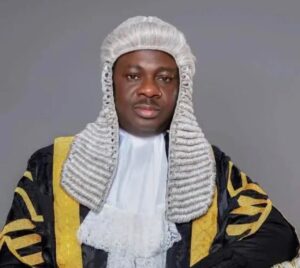
Donald Trump addressing voters during the Iowa caucuses
* Pushes to a rematch with Biden
* Calls for unity
Donald Trump romped to a decisive victory Monday night in the frigid Iowa caucuses, cementing his formidable grip over the Republican Party and pushing the nation closer to a historic modern rematch with President Biden
[the_ad id=”16914″]
With 96 percent of the vote tallied, Trump was leading with 51 percent Monday night — more than his next two rivals combined. His wide advantage on a night when turnout was low put him on pace to shatter the previous margin of victory in the Republican caucuses, as Florida Gov. Ron DeSantis narrowly edged out former South Carolina governor Nikki Haley for second place.
Trump’s victory came a little more than a year after he announced his 2024 bid to little fanfare and some doubts about his ability to consolidate his party behind him, following his 2020 loss to Biden and his alleged incitement of the deadly Jan. 6, 2021, attack on the U.S. Capitol.
Trump’s strong finish in the caucuses underscored his dominance over his party’s base, in a presidential contest expected to play out as much in the courtroom as the campaign trail. The former president faces 91 charges across four criminal cases, and right after the caucuses, he will head to New York where he plans to take part on Tuesday in one of the several civil and criminal cases pending against him.
[the_ad id=”16918″]
His win also affirmed the enduring appeal, at least among the Republican base, for Trump to return to power to exact revenge on his political opponents, pursue a more extreme agenda, and root out career bureaucrats that he dismisses as the “deep state.” The former president has continued to push false claims about the 2020 election, as well as use ominous and threatening rhetoric that historians have compared to authoritarian regimes.
Still, roughly half of Republicans in a conservative state voted against the former president, though broader trends may be difficult to discern given the low turnout. In total, Edison Research estimated turnout at 115,000 on Monday night — down from 186,657 in 2016 and lower than 121,503 in 2012 and 119,207 in 2008.
Thirty-one minutes after the caucuses began, and with only a small slice of votes counted, the Associated Press called the race for Trump. The early decision infuriated DeSantis’s campaign, with officials alleging the media was interfering with the caucus process. In some precincts, voters were still listening to speeches from campaign representatives, and had not even written down their preferred candidate yet.
At the Trump campaign victory party in Des Moines, the ballroom remained largely silent when the race was called for Trump — because no one was there to cheer. Neither the former president nor any of his supporters had arrived yet. The bartender staffing the cash bar was also not there yet, and bowls of popcorn remained untouched on empty tables.
[the_ad id=”16917″]
Speaking roughly two hours after officially winning the caucuses, Trump offered an uncharacteristically unifying message.
“We want to come together,” a subdued Trump told his supporters. “Whether it’s Republican or Democrat, liberal, conservative, it would be so nice if we could come together and straighten out the world and straighten out the problems and straighten out all of the death and destruction that we’re witnessing.”
Monday’s caucuses were the coldest in history, with temperatures falling below zero as Iowans trudged to schools, churches and community centers across the state to register their choices. In the days leading up to the contests, candidates were forced to cancel events because of hazardous conditions, prompting questions about turnout and which candidates might suffer if voters decided to stay home.
[the_ad id=”16920″]
Trump’s win put him well-ahead of the previous historic victory margin in a contested Iowa caucuses — then-Kansas Sen. Bob Dole’s roughly 13-point margin here in 1988 — but behind his own outsize boasts of finishing as many as 60 points ahead of the field.
Trump’s Iowa win, long expected by his opponents, left in its wake a pitched battle between DeSantis and Haley after he narrowly muscled ahead her to take second.
Addressing his supporters Monday night, DeSantis claimed his opponents “threw everything but the kitchen sink at us,” before crowing, “We’ve got our ticket punched out of Iowa.”
DeSantis — who launched his campaign last May, only to plummet in the polls — had largely staked his 2024 fortunes on a strong finish in Iowa, where he had the support of Kim Reynolds, the state’s Republican governor, and influential evangelical leader Bob Vander Plaats.
Trump has openly clashed with Reynolds and Vander Plaats, and his win served as yet another powerful reminder that the base of the party is now often at odds with Republican leaders who dare to criticize Trump.
DeSantis plans to fly Monday evening to Haley’s home state of South Carolina, heading there first before New Hampshire — whose primary is next Tuesday — in a sign he is not willing to cede last-candidate-standing-against-Trump status to her. DeSantis has fallen into the single-digits in polls of the New Hampshire race, where Haley stands alone in second place to Trump.
Even with a third-place finish, Haley attempted to use the Iowa results to cast herself as the only alternative to Trump. “I can safely say Iowa made this Republican primary a two-person,” she said.
But the narrow loss to DeSantis may stymie her goal of slingshoting to the top of the next primary matchup. Still, Haley struck a more aggressive tone against Trump, arguing that “70 percent of Americans don’t want another Trump-Biden rematch” and warning he could lose to Biden again.
She headed straight to New Hampshire, a state where she is expected to do well, though it will depend significantly on the degree of participation of undeclared voters, among whom Haley performs best.
[the_ad_placement id=”advert”]
“Tonight I will be back in the great state of New Hampshire and the question before Americans is very clear: Do you want more of the same or do you want a new generation of conservative leadership?” she said.
From there, the Republican nominating contest shifts to South Carolina, where Haley was twice elected governor and where her team argues she has home state advantage. The Trump campaign, however, as well as some longtime South Carolina Republicans, say that Haley is hardly the assured winner of the state’s primary on Feb. 24, and that Trump could easily beat her on her home turf.
Tech entrepreneur Vivek Ramaswamy ended his campaign Monday night after a disappointing fourth-place finish, throwing his support behind Trump.
[the_ad_placement id=”advert-1″]
Beyond the 2024 stakes, Trump’s Iowa victory also holds outsize symbolic importance for the former president and his team. In 2016, Sen. Ted Cruz (R-Tex.) narrowly edged Trump out for first place here, a loss that, despite becoming the Republican nominee, Trump has never forgotten.
Members of his 2016 campaign later recalled, only half-jokingly, descending into Des Moines on Trump’s private jet as aides frantically googled, “What is a caucus?” The 2016 operation had almost no on-the-ground organization in Iowa, and eight years later, Trump vowed not to repeat the same mistakes.
This time, despite still spending far less time on the ground in the state than many of his rivals, the Trump operation was far more disciplined and prepared than in 2016. They had over 1,800 caucus captains — a captain for every caucus site, as well as the top 1,000 precincts, said a Trump adviser, who added that the team conducted over 300 caucus captain trainings.
As a blizzard bore down on the state, the Trump campaign deployed staff to take pictures of the parking lots at some caucus sites, to ensure they were accessible and not socked in by snow, the Trump adviser said. The operation also enlisted farmers on their supporter list in two rural counties to clear gravel roads that were still snow-logged, and was regularly in touch with the board of supervisors and the mayors in both areas to ensure the districts had the necessary resources to ensure safe travel, this person added.
On his final day in Iowa, DeSantis crisscrossed the state, trying to win over those who were still making up their minds. He began the morning at his campaign headquarters outside Des Moines, where he cheered on his staff and volunteers before heading to the western part of the state. He visited a bar in Sergeant Bluff, a bowling alley in Council Bluffs and a restaurant in Cedar Rapids. He then visited sites on the other side of the state in Dubuque, before ending his night at his campaign watch party with supporters in West Des Moines.
Haley spent her final day in and around Des Moines, swinging by a bakery in Pella and a pub in Newton to make her final pitch centered on a new generation of conservative leadership. She also reminded voters that polls consistently show her besting Biden by far bigger margins than Trump or her fellow Republican candidates.
[the_ad_placement id=”advert-2″]
Trump, meanwhile, kept a low-key public schedule in the run-up to the caucuses — a clear sign of his team’s confidence. After most of his weekend events were scrapped because of the weather, he only held one in-person event, a Sunday rally in Indianola.
Speaking in Indianola, he lashed out at his main rivals as disloyal, derided Reynolds, the state’s Republican governor, and attacked his critics. He also warned his supporters against complacency and staying home despite the bitter cold.
“You can’t sit home. If you’re sick as a dog, you say, ‘Darling, I gotta make it,’” he told the crowd. “Even if you vote and then pass away, it’s worth it, remember.”
On Monday, Trump spent the morning meeting with senior staff at the Hotel Fort Des Moines, and spoke briefly to reporters, promising “a tremendous night.”
Then, as his Republican rivals raced around the state, trying to shore up every last vote, Trump headed to 801 Chophouse in Des Moines where he ordered his usual: a steak, well-done.
Source: Washington Post





